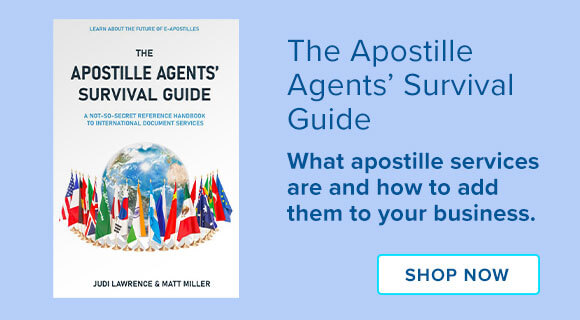Updated 9-3-24. Mobile Notaries across the country constantly look for ways to grow their business. One way they do this is by adding services, and an example of this is apostille services. This service fits nicely with a Notary business because customers often ask Notaries to provide apostilles.
While Notaries cannot issue apostilles — only an authorized state agency can do so — you can earn extra income by assisting customers in getting their documents in the correct form to be accepted by the agency that issues apostilles.
There are a number of elements you need to understand as you consider adding this service to your business:
- What is an apostille?
- What is an apostille agent?
- What are Some of the Functions of an apostille agent?
- How much can I charge for apostille services?
- What are the benefits of becoming an apostille agent?
- Important facts about obtaining apostilles
What is an ‘apostille’?
In the modern world, countless documents are signed and sent between countries, many of them notarized or including the signature of some other public official. The challenge for individuals receiving the documents is knowing whether the Notary’s signature is legitimate.
An apostille is a certificate issued by a government agency verifying the authenticity of the signature of a Notary Public or other public official. In other words, an apostille confirms that the seal and signature of the Notary on a document is valid, and the notarization can be accepted by the receiving agency in the foreign country.
They are specifically used for documents going to the 156 signatories to the Hague Apostille Convention. Documents sent to countries that are not part of the Hague Convention may require additional certification from the U.S. Department of State.
What is an ‘apostille’ agent?
An apostille agent assists customers in obtaining apostilles or authentications.
However, it’s important to make one thing clear: You (the Notary) do not issue apostilles or attach them to documents. That is the role of the state agency authorized to issue apostilles, usually the Secretary of State’s office.
Only an authorized government agency can place the actual certificate of apostille on the document. However, an apostille agent can provide other valuable services to assist customers in need of apostilles, as described below.
What are some functions of an ‘apostille agent’?
Apart from notarizing the signatures on a document, an apostille agent can provide a variety of services.
For example, an agent can provide courier services to deliver notarized documents requiring apostilles to the appropriate agency. This might entail sending the notarized document, a check for the processing fee, the apostille request form and a return mailing label to the apostille-issuing agency on the customer’s behalf. The agency would then process the request, attach the apostille and mail the document with the apostille back to the Notary or the customer.
Apostille agents may also contact the issuing agency on the customer’s behalf to request instructions related to obtaining an apostille. For example:
- You might be asked to find out if the agency requires the customer to submit the original notarized document, or if the customer can provide a certified copy of the document instead. Please remember that not all states authorize Notaries to certify copies of documents, and Notaries are never allowed to certify copies of vital statistics documents such as a birth certificate, a death certificate, a marriage license or a divorce decree.
- You may also be asked to confirm with a state agency if they will issue an apostille for a document notarized using remote notarization or other details such as whether the document requires translation or a cover page, or contact a federal agency to ask if the receiving country will require additional documentation.
How much can I charge for ‘apostille’ services?
Because apostille services are not part of your duties as a Notary, the fees you charge are not limited by your state Notary laws. As such, you may set your fees for those services at your discretion. You should consider the following factors when deciding what to charge:
- How many documents you are sending for processing and what are the state fees;
- Where the documents are being sent for processing;
- What kind of shipping costs you are incurring; and
- Whether you are asked to provide expedited service.
Remember that fees you charge for apostille-related services (such as submitting documents to the issuing agency on a customer’s behalf) should be charged and recorded separately from your fees for notarial acts, which are regulated by your state’s Notary laws.
Like any new business service you decide to offer, becoming an apostille agent involves a learning curve. However, it can also be profitable and enjoyable.
What are the benefits of becoming an ‘apostille’ agent?
In my experience, becoming an apostille agent affords you several benefits.
It complements traditional Notary businesses very well. You will have numerous opportunities to offer apostille business services to your existing customers. I do quite a bit of general notarization work and never miss a chance to tell a client that I am also an apostille agent. Often that client has never heard of an apostille. I explain what it is, give them my business card and wait for the phone to ring — and it has.
It’s very easy to offer apostille agent services as either a part-time or full-time business because you have a flexible schedule. If you work out of a specific location, you can arrange appointments to accommodate your own schedule. If you are a mobile Notary, you may want to charge a travel fee to go to the client to pick up the documents and deliver them back to the client.
Many Secretaries of State are now accepting documents for apostilles that have been notarized using remote online notarization (RON). If you are authorized to perform RONs, you might remotely notarize documents and then offer services sending and delivering remotely notarized documents requiring apostilles to issuing agencies for your clients.
Important facts about obtaining ‘apostilles’
Here are important details about apostilles you should know if you want to offer apostille agent services:
Every apostille is issued by the government agency (usually the Secretary of State’s office) in the state where the document ORIGINATED. For example, let’s say our client went to school in California, now lives in Pennsylvania and needs an apostille for his California school diploma. Because the diploma was issued in California, the apostille must be obtained from the California Secretary of State’s office.
The destination country may affect whether the customer needs authentication documentation instead of an apostille. In 1961, many countries joined the Hague Convention, which allows expedited authentication of documents sent between member nations. Most countries in the world are members of the Hague Convention, but some are not.
If the destination country is NOT a member of the 1961 Hague Convention, the document may require additional paperwork from the U.S. Department of State in addition to the apostille. In some instances, a client may also want you to present the documents to an embassy of the destination country on their behalf.
So you will need to ask clients several important questions:
- What is the type of document(s)
- Where did it originate (STATE OF ORIGINATION); and
- Where will it be going (COUNTRY OF DESTINATION)
If you decide to add being an apostille agent to your business, it can be a profitable and enjoyable line of work.
Judith Lawrence is a Notary, educator and apostille agent, and is the author of the upcoming book ‘The Not So Secret Guide To International Document Service.’ For more information, please visit her website.




Related Articles:
Notarizing documents from other countries